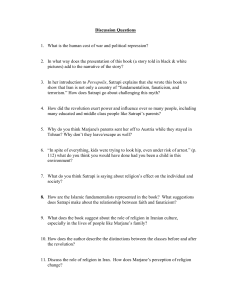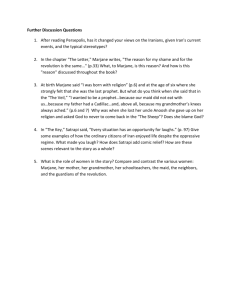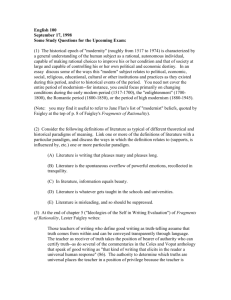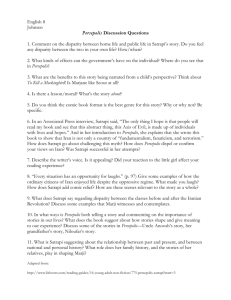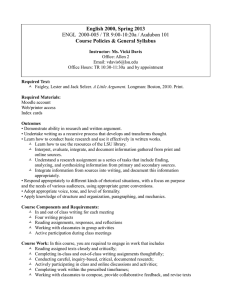Karl Marx, “The German Ideology: Part I” (1845-46)
advertisement
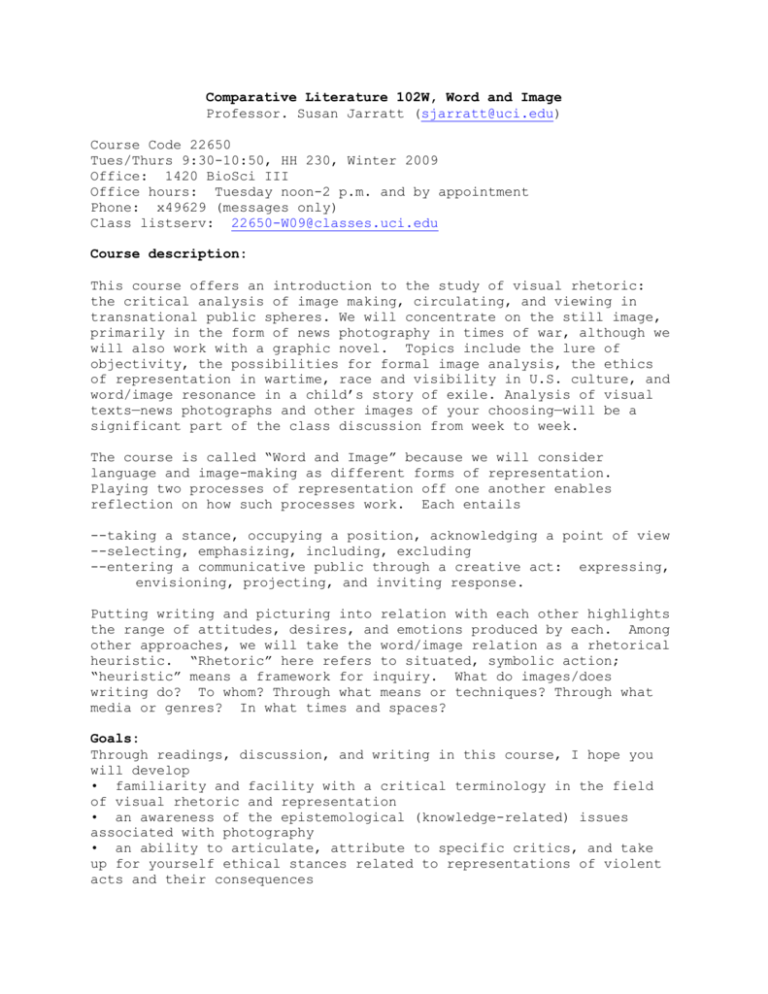
Comparative Literature 102W, Word and Image Professor. Susan Jarratt (sjarratt@uci.edu) Course Code 22650 Tues/Thurs 9:30-10:50, HH 230, Winter 2009 Office: 1420 BioSci III Office hours: Tuesday noon-2 p.m. and by appointment Phone: x49629 (messages only) Class listserv: 22650-W09@classes.uci.edu Course description: This course offers an introduction to the study of visual rhetoric: the critical analysis of image making, circulating, and viewing in transnational public spheres. We will concentrate on the still image, primarily in the form of news photography in times of war, although we will also work with a graphic novel. Topics include the lure of objectivity, the possibilities for formal image analysis, the ethics of representation in wartime, race and visibility in U.S. culture, and word/image resonance in a child’s story of exile. Analysis of visual texts—news photographs and other images of your choosing—will be a significant part of the class discussion from week to week. The course is called “Word and Image” because we will consider language and image-making as different forms of representation. Playing two processes of representation off one another enables reflection on how such processes work. Each entails --taking a stance, occupying a position, acknowledging a point of view --selecting, emphasizing, including, excluding --entering a communicative public through a creative act: expressing, envisioning, projecting, and inviting response. Putting writing and picturing into relation with each other highlights the range of attitudes, desires, and emotions produced by each. Among other approaches, we will take the word/image relation as a rhetorical heuristic. “Rhetoric” here refers to situated, symbolic action; “heuristic” means a framework for inquiry. What do images/does writing do? To whom? Through what means or techniques? Through what media or genres? In what times and spaces? Goals: Through readings, discussion, and writing in this course, I hope you will develop • familiarity and facility with a critical terminology in the field of visual rhetoric and representation • an awareness of the epistemological (knowledge-related) issues associated with photography • an ability to articulate, attribute to specific critics, and take up for yourself ethical stances related to representations of violent acts and their consequences 2 • a curiosity about the circuits of production, reception (including various media), and historical contexts surrounding visual images, along with some experience in researching those contexts in relation to specific images. I also hope that you will be able to bring your own viewing, imagemaking, and writing experiences into the class—for reflection, exploration, and material for discussion and writing. Writings: [This course fulfills the upper-division writing breadth requirement. Completing lower-division writing is a prerequisite.] Here is what I hope you will accomplish with writing in this course: • write some short pieces using several genres (description, expressive response, formal analysis, text-based argument, exploration, and perhaps researched writing) • build an extended essay of visual analysis on an image of your choice over the course of the quarter, incorporating these shorter writings • use a collaborative, process approach to writing, involving draft, consultation with your classmates and with me, and revision • have the choice to produce a single long essay over the quarter (1012 pages) or two shorter pieces (5-6 pages each) I will pass out more detailed instructions for each major piece when it is assigned. Short (sometimes unannounced) in-class writings will be based on the readings and will focus on the goals above. The lengths of individual pieces will vary, but you will need to produce a total of approximately 15 pages for the quarter. You will turn in all your writing (short writing, drafts, and revisions) in a portfolio at the end of the quarter. Everyone will come in for an individual conference about your writing at some point during the quarter. Course texts: Susan Sontag, Regarding the Pain of Others Marjane Satrapi, Persepolis Faigley, The Little Penguin Handbook Essays available on electronic reserve (ER) Grade: Attendance, participation, short writings Major writing assignments, portfolio 20% 80% Tentative Schedule: Week 1 - 1/6, 8 Introductions; in-class writing Responding to news photographs: from Barthes, Camera Lucida (handout) – photo and response 1-page response to photo 3 Week 2 - 1/13, 15 Barthes, “The Photographic Message” (ER)– formal analysis 1-2 page response and formal analysis of a photo Faigley, Ch. 1-3 – rhetoric, composing, point of view, critical reading and viewing Week 3 - 1/20, 22 Sontag, Regarding the Pain of Others Longer paper assigned Group discussion of photos Faigley, Ch. 4-6 – planning, drafting, composing paragraphs Week 4 - 1/27, 29 Sontag continued Zelizer, “The Voice of the Visual in Memory” (ER) McNally, New York Times policies on photojournalism (ER) Faigley, Ch. 7 – revising, editing, proofreading Begin conferences. Week 5 - 2/3, 5 Enloe, “Nationalism and Masculinity” (ER) Hariman and Lucaites, “Liberal Representation and Global Order: Iconic Photograph from Tiananmen Square” (ER) The Week 6 - 2/10, 12 Williams, “On Being an Object of Property” (ER) Oliver, “Seeing Race” (ER) Draft of longer paper due: peer review Week 7 - 2/17, 19 Cooks, “Confronting Terrorism: Teaching the History of Lynching through Photography,” Nka: Journal of Contemporary African Art. Strange Fruit: Lynching, Visuality, Empire: Issue #21: Fall 2006 (handout) Faigley, Ch. 9-13 – resources for researched writing; using sources ethically and effectively; paraphrase, summary Week 8 - 2/24, 26 Marjane Satrapi, Persepolis Reading graphic novels: Scott McCloud (handout) Optional short paper assigned Online evaluation period begins Week 9 - 3/3, 5 Moallem, “Transnationalism, Feminism, and Fundamentalism” (ER) Satrapi, “Defending My Country” (New York Times, Nov. 28, 2005) (ER) Film: Persepolis Week 10 - 3/10 (no class Thurs., 3/12) Finish film; full-class discussion of short papers-in-process 4 Writing portfolios due in Comp Lit office by 5 p.m. Monday, 3/16 (online evaluation must be completed) Policies: Attendance Attendance is required. Please notify me if you must be absent for illness or family emergency. Excessive absence (more than two of our nineteen scheduled sessions) will be grounds for failure. All work must be completed for you to pass the course. Any writing (informal, draft, revised essay) not turned in on the date due will receive a grade penalty. Excessive or repeated lateness will lower your grade. Academic Honesty All work must be your own and created for this course. Please review UCI’s Principles of Community to inform yourself of definitions of academic dishonesty and penalties for violating these principles: http://www.editor.uci.edu/catalogue/appx/appx.2.htm School of Humanities Add/Drop Policies Any student may add or drop a Humanities course through the end of the second week of classes. An exception may only be requested for extenuating circumstances outside the student's control, by submitting a Late Add/Drop petition to the instructor and Humanities Undergraduate Study (HIB 143). Humanities majors may, with an instructor's signature, add or drop a non-Humanities course through the end of the sixth week of classes, subject to any deadlines imposed by the School/Program where the course is offered. Majors in Humanities may change the grading option in a course through the end of the sixth week of classes.
